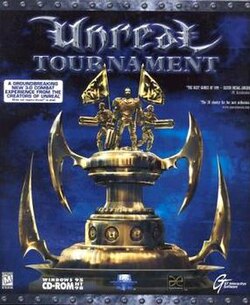Unreal Tournament (1999)
| Unreal Tournament | |
|---|---|
 |
|
| Developer(s) | |
| Publisher(s) |
|
| Designer(s) |
|
| Programmer(s) |
|
| Artist(s) | Shane Caudle |
| Composer(s) | |
| Series | Unreal |
| Engine | Unreal Engine 1 |
| Platform(s) | Microsoft Windows, Classic Mac OS, Linux, PlayStation 2, Dreamcast |
| Release |
Windows Classic Mac OS
Dreamcast |
| Genre(s) | First-person shooter |
| Mode(s) | Single-player, multiplayer |
| Aggregate score | |
|---|---|
| Aggregator | Score |
| Metacritic | PC: 92/100 PS2: 77/100 DC: 90/100 |
| Review scores | |
| Publication | Score |
| AllGame |
|
| CGW |
|
| CVG | 9/10 (PC) |
| Edge | 7/10 (PC) 6/10 (Dreamcast) |
| Eurogamer | 10/10 (PC) |
| Game Informer | 9/10 (PS2) |
| GamePro |
|
| Game Revolution | A- (PC) |
| GameSpot | 9.5/10 (PC) |
| GameSpy | 94/100 (PC) 77% (PS2) 8/10 (Dreamcast) |
| IGN | 9.6/10 (PC) 9.6/10 (Mac) 8.4/10 (PS2) |
| PC Gamer (UK) | 92/100 (PC) |
| PC Gamer (US) | 90/100 (PC) |
| Computer Games Magazine |
|
| The Electric Playground | 10/10 (PC) |
| PC Zone | 90/100 (PC) |
| Gamezilla | 86% (PS2) 87% (Dreamcast) |
| Happy Puppy | 9/10 (Mac) 8/10 (Dreamcast) |
| Inside Mac Games | 9/10 (Mac) |
| Dreamcast Magazine (UK) | 87% (Dreamcast) |
| Maximum PC | 9/10 (PC) |
| GameFan | 95/100 (PC) |
| CNET | 10/10 (PC) |
Unreal Tournament is a first-person shooter video game developed by Epic Games and Digital Extremes. The second installment in the Unreal series, it was first published by GT Interactive in 1999 for Microsoft Windows, and later released on the PlayStation 2 by Infogrames, and on the Dreamcast by Secret Level. Players compete in a series of matches of various types, with the general aim of out-killing opponents. The PC version supports multiplayer online or over a local area network. Free expansion packs were released, some of which were bundled with a 2000 re-release: Unreal Tournament: Game of the Year Edition.
The game is based on the same technology that powered Unreal, but the design of Unreal Tournament shifted the series' focus to competitive multiplayer action. Development took almost a year and a half, and the game was initially intended to be an expansion for Unreal. Unreal Tournament received critical acclaim, with reviewers praising the graphics, artificial intelligence and gameplay, although the console ports were noted for having limitations. The game won several awards, and the series has continued with the releases of sequels Unreal Tournament 2003 in 2002, Unreal Tournament 2004 in 2004, and Unreal Tournament 3 in 2007.
Unreal Tournament is an arena first-person shooter, with head-to-head multiplayer deathmatches being the primary focus of the game. The single-player campaign is a series of arena matches played with bots, where the player competes for the title of Grand Champion. The player moves up the tournament ladder in order to challenge the current champion, Xan, a mysterious being with exceptional skill. Also available is a Practice mode, in which, as its name implies, the player practices a match. Match settings (such as score and time limits) can be customized. Also available are "mutators" which drastically alter gameplay aspects, such as "InstaGib", the use of which makes players compete with instant-kill weapons instead of the normal ones. Weapons include Enforcers, Rocket Launchers, and Rippers, which fire ricocheting blades. Most weapons have two firing modes which have different effects: for example, Rippers can also fire non-ricocheting blades which explode on impact. A special weapon is the Redeemer, which causes a very large and powerful explosion. Items such as Body Armor (which reduce damage taken), health packs (which heal players), and Damage Amplifiers are scattered across levels. Levels are set in a variety of environments, including spaceships, outposts, and buildings such as castles and monasteries. Many contain features such as elevators (lifts) and teleporters, and obstacles such as water and lava. The game is backwards compatible with the majority of Unreal multiplayer maps. The PC version includes a level editor in which players can create their own levels, and the PlayStation 2 version supports the use of a USB keyboard and mouse, enabling players to play in a similar manner to the PC version.
...
Wikipedia
